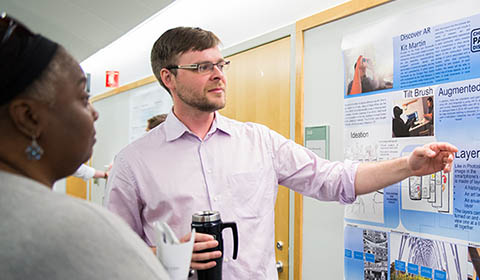SESP Receives $4.5 Million Grant to Train Education Researchers

Northwestern University’s School of Education and Social Policy (SESP) has received a five-year, $4.5 million grant from the Institute of Education Sciences to help train doctoral students in the art of rigorous and relevant education research.
The Multidisciplinary Program in Education Sciences (MPES), will bring together 22 young Northwestern scholars from a wide variety of disciplines, including sociology, economics, statistics, psychology, learning sciences, and human development. This diversity allows the team to address complex questions using comprehensive research designs.
Each recruit will receive 3-year training fellowships that include annual tuition, stipends, and a fund for research and travel. They also participate in a proseminar and a series of intensive workshops to learn about relevant topics, such as new statistical techniques and the open science movement.
Core faculty members will teach, mentor, and collaborate with the doctoral fellows as they learn to connect their research with policy and practice.
The MPES Steering Committee faculty includes Cynthia Coburn, professor of education and social policy; Jonathan Guryan, Lawyer Taylor Professor of Education and Social Policy; Larry Hedges, Board of Trustees Professor of Statistics and Social Policy; C. Kirabo Jackson, Abraham Harris Professor of Education and Social Policy; Nichole Pinkard, associate professor of learning sciences; Diane Schanzenbach (ex officio), Margaret Walker Alexander Professor of Human Development and Social Policy; and James Spillane (ex officio), Spencer T. and Ann W. Olin Professor in Learning and Organizational Change.
Schanzenbach also is director of the Institute for Policy Research; Hedges, Guryan, and Jackson are IPR faculty fellows.
The new grant builds on the success of the current MPES program. It’s the fourth time that SESP has received the five-year grant since the original award in 2004. The total projected cost of the training program is $6.4 million. In addition to the grant from IES, Northwestern will contribute approximately $1.9 million in cost-sharing.
“The MPES program is a model for bridging the gap between education research, policy, and practice, and for bringing together students and faculty from a variety of disciplines,” said professor David Uttal, director of the MPES program, which he also led from 2008 until 2013.
"Our students are rigorously trained in quantitative and qualitative methods. And while the program funds student research, it also benefits participating faculty because it provides a structure to collaborate across shared interests that might otherwise remain opaque.”
Partnering with Evanston Township High School
The MPES program is the foundation of another model effort: a research-practice partnership between Northwestern University and Evanston Township High School called the Northwestern Evanston Education Research Alliance (NEERA). The collaboration brings together Evanston schools, their administrators, and Northwestern researchers to improve the lives of Evanston students by researching and implementing practical research findings.
MPES students spend a year with Evanston Township High School using school-supplied data to answer questions drawn up by teachers and school leaders, such as “how can teachers create a supportive STEM learning environment for girls and students of color?” At the end of the year, the students present their findings and recommendations to school leaders.
“The partnership helped our faculty look at the data in new and different ways, gave us some take-away ideas and helped continue conversations,” said Carrie Levy, director of research, evaluation, and assessment at ETHS.
During the 2015–16 partnership cycle, fellows Elizabeth Debraggio, Courtenay Kessler, and Heyu Xiong, examined an academic support program that targets highly motivated ETHS students who are underrepresented in post-secondary education or first-generation college-bound students. To the school’s surprise, the team found it was exceeding expectations.
“We never would have done such a deep dive,” said Pete Bavis, assistant superintendent for curriculum and instruction for Evanston Township High School District 202. “When we realized it was doing better than we thought, it teed up other research questions involving our program.”
Proven success
Since its inception in 2004, MPES has trained 77 fellows; 18 are still finishing their PhD. Some fellows have become faculty members at top universities across the country. Vivian Wong was awarded the 2010 IES Outstanding Predoctoral Fellow award. she and former fellow, Natalia Palacios, are currently associate professors at the Curry School of Education at the University of Virginia, where they teach quantitative methods courses to future researchers.
Another former MPES fellow, statistician L. Elizabeth (Beth) Tipton, has returned to Northwestern as associate professor in statistics. Former fellow, Aaron Sojourner, is associate professor in the Carlson School of Business at the University of Minnesota and served as a member senior economist for labor at the U.S. President’s Council of Economic Advisers.
In addition to placing former fellows in academic positions, several are now research scientists at major research firms, such as the American Institutes of Research (AIR). They also are working at research and data analysis firms that focus on educational issues. Others have become entrepreneurs or are working in non-profits or education administration.
To be eligible, students must be first-year PhD students at Northwestern in engineering, human development and social policy, learning sciences, psychology, sociology, or statistics. Second-year PhD students in economics are also eligible to apply. Applicants must also be U.S. citizens.
The Institute of Education Sciences (IES) is the research arm of the U.S. Department of Education. IES is dedicated to providing rigorous evidence on which to base education practice and policy and sharing this information broadly.
For more information, visit the MPES website.